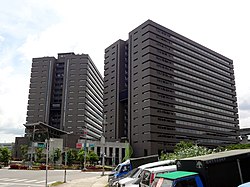| 原住民族委員會 Yuánzhù Mínzú Wěiyuánhuì (Mandarin) Ngièn-chhu-mìn-chhu̍k Vî-yèn-fi (Hakka) | |
 | |
| Agency overview | |
|---|---|
| Formed | 10 December 1996 (as Council of Aboriginal Affairs) 25 March 2002 (as Council of Indigenous Peoples) |
| Jurisdiction | Republic of China (Taiwan) |
| Headquarters | North Tower, Xinzhuang Joint Office Tower, New Taipei |
| Ministers responsible |
|
| Parent agency | Executive Yuan |
| Website | Official website |
| Part of a series on |
| Indigenous rights |
|---|
| Rights |
| Governmental organizations |
| United Nations initiatives |
| International Treaties |
| NGOs and political groups |
| Issues |
| Countries |
| Category |
The Council of Indigenous Peoples (CIP; Chinese: 原住民族委員會; pinyin: Yuánzhù Mínzú Wěiyuánhuì; Pe̍h-ōe-jī: Goân-chū-bîn-cho̍k Úi-oân-hōe), formerly known as the Council of Aboriginal Affairs, is a ministry-level body under the Executive Yuan in Taiwan (Republic of China). It was established to serve the needs of the country's indigenous populations as well as a central interface for the indigenous community with the government.
The CIP promotes the use and revitalization of Taiwan's indigenous languages, supported legislation that would grant autonomous land to indigenous peoples, strengthened relations between Taiwan's indigenous groups and those in other countries and raised awareness of indigenous cultures. Among its responsibilities, it grants recognized status to indigenous peoples of Taiwan.
The CIP has long strong tie with NDHU College of Indigenous Studies, which is largely funded by CIP and serves as think tank of indigenous issues.[1] The council has been criticized by both indigenous and non-indigenous individuals and groups. These criticisms tend to accuse the Council of ineffectiveness, and of discriminating against plains indigenous peoples.[citation needed]